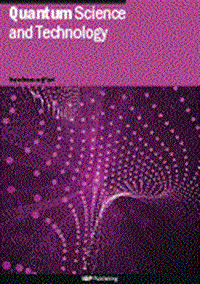光子数分辨探测器高斯玻色子取样器的验证试验
IF 5
2区 物理与天体物理
Q1 PHYSICS, MULTIDISCIPLINARY
引用次数: 0
摘要
当前这一代嘈杂的大规模量子计算机面临的一个重要挑战是验证问题。硬件能产生正确的答案吗?如果不是,错误是什么?这个问题通常与计算优势问题结合在一起,但它是一个根本不同的问题。在当前的实验中,对输出统计数据的完全验证通常是不可能的,因为这样做的难度是指数级的。在这里,我们应用相空间模拟方法来部分验证最近在高斯玻色子采样(GBS)上实现光子数分辨探测器的实验。采用正p相空间分布,因为它使用概率抽样来降低复杂性。它比直接经典模拟288模式的实验快几倍,量子计算优势被宣称。结合分箱和边际化来改进统计量,可以有效地计算多个验证测试,其中一些测试可以在实验数据上进行。我们表明,数据作为一个整体与理论预测的完美挤压有差异。然而,对GBS参数的修改大大提高了某些测试的一致性。我们建议这些验证测试可以作为反馈方法的基础,以改进GBS实验。本文章由计算机程序翻译,如有差异,请以英文原文为准。
Validation tests of Gaussian boson samplers with photon-number resolving detectors
An important challenge with the current generation of noisy, large-scale quantum computers is the question of validation. Does the hardware generate correct answers? If not, what are the errors? This issue is often combined with questions of computational advantage, but it is a fundamentally distinct issue. In current experiments, complete validation of the output statistics is generally not possible because it is exponentially hard to do so. Here, we apply phase-space simulation methods to partially verify recent experiments on Gaussian boson sampling (GBS) implementing photon-number resolving detectors. The positive-P phase-space distribution is employed, as it uses probabilistic sampling to reduce complexity. It is times faster than direct classical simulation for experiments on 288 modes where quantum computational advantage is claimed. When combined with binning and marginalization to improve statistics, multiple validation tests are efficiently computable, of which some tests can be carried out on experimental data. We show that the data as a whole has discrepancies with theoretical predictions for perfect squeezing. However, a modification of the GBS parameters greatly improves agreement for some tests. We suggest that such validation tests could form the basis of feedback methods to improve GBS experiments.
求助全文
通过发布文献求助,成功后即可免费获取论文全文。
去求助
来源期刊

Quantum Science and Technology
Materials Science-Materials Science (miscellaneous)
CiteScore
11.20
自引率
3.00%
发文量
133
期刊介绍:
Driven by advances in technology and experimental capability, the last decade has seen the emergence of quantum technology: a new praxis for controlling the quantum world. It is now possible to engineer complex, multi-component systems that merge the once distinct fields of quantum optics and condensed matter physics.
Quantum Science and Technology is a new multidisciplinary, electronic-only journal, devoted to publishing research of the highest quality and impact covering theoretical and experimental advances in the fundamental science and application of all quantum-enabled technologies.
 求助内容:
求助内容: 应助结果提醒方式:
应助结果提醒方式:


